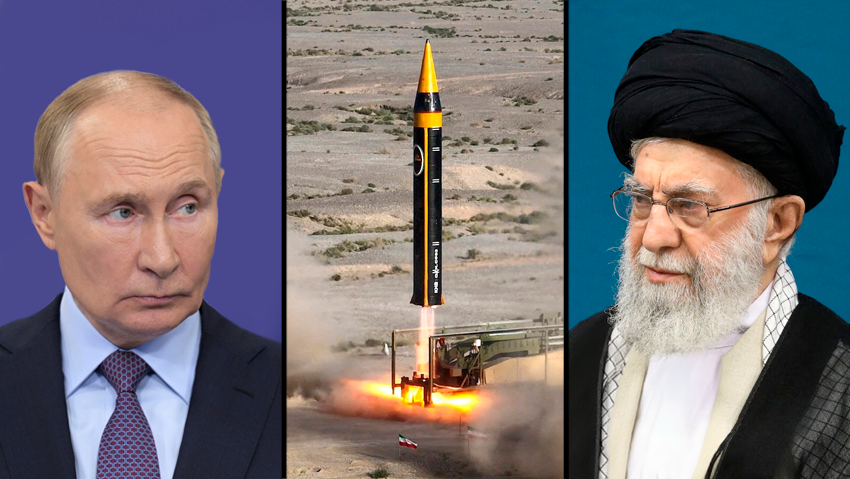Getting your Trinity Audio player ready...
In the past weeks, the Kremlin, seemingly unencumbered by facts, has shifted blame for the war in Lebanon to Israel, ignoring Hezbollah's year-long assault on Israel’s northern communities.
Moscow overlooked Iran's ballistic missile strike on Israel on October 1, choosing instead to condemn Israel for the assassination of Hezbollah leader Hassan Nasrallah, blaming it for the "expected escalation" and accusing it of "murdering Lebanese civilians."
2 View gallery


Putin silent on Iran's attack against Israel
(Photo: Reuters, Alexei Nikolsky, Sputnik, Kremlin Pool Photo via AP, AFP PHOTO / HO / KHAMENEI.IR)
Russia made no mention of Hezbollah’s attack on October 8 last year, which led to thousands of rockets and missiles being fired at Israeli civilians near the border, internally displacing tens of thousands of residents in northern Israel.
Russia, which does not view Hezbollah as a terrorist group, regularly engages with its leaders, including its Nasrallah up until his death. Last week, Russian Deputy Foreign Minister Mikhail Bogdanov criticized Israel's ground operations in southern Lebanon during a meeting with Lebanon’s ambassador in Moscow, underscoring the Kremlin's opposition to Israel’s actions, which they termed as "political assassinations."
Just before Iran's missile attack, Russian Prime Minister Mikhail Mishustin visited Tehran, underscoring the growing strategic partnership between Moscow and Tehran amid the war in Ukraine and tensions between Israel, Hezbollah and Iran.
This visit, which included a face-to-face with Iranian President Masoud Pezeshkian, highlighted the increased frequency of high-level Russian visits to Iran, aiming to bolster security ties. Significantly, Putin agreed to a strategic partnership with Tehran.
2 View gallery


Putin ignored Iran's attack, but was quick to condemn Israel for the strike on Beirut
(Photo: AP /Hussein Malla)
This intensified Russian-Iranian cooperation raises concerns in Jerusalem due to its security implications. The deepening ties are largely a byproduct of the Ukraine conflict and Russia's military reliance on Iran.
Western intelligence reports indicate that Iran has recently supplied Russia with ballistic missiles and drones. To be specific, Tehran has supplied the Russians with 200 ballistic short-range missiles, on top of thousands of Iranian-made drones, including the explosive drone called Shahed-131, as well as the Shahed-136 kamikaze drone, a supply arrangement originating in 2022, when Russia realized it needed the assistance, given the Ukrainian armed forces' stubborn refusal to throw in the towel.
Russia's reliance on Tehran grants it leverage, raising Western fears that Moscow might share nuclear knowledge in return for military aid. Both nations, alongside China, aim to promote a multipolar world order, reducing U.S. hegemony, while both suffer under Western sanctions.
None of that means the Kremlin is interested in a direct Israel-Iran war. Moscow’s critical stance toward Israel aligns with its growing military dependence on Iran. The Middle East escalation serves Russian interests by diverting Western focus from Ukraine and redirecting U.S. military resources.
Russia President Vladimir Putin talks about US presidential candidate Kamala Harris
While a direct Iran-Israel conflict might spike energy prices globally, benefiting Moscow financially, it could also harm Iran, a strategic ally, thus conflicting Russian interests. High energy prices could also impact U.S. politics, as higher gas prices before the election could dampen enthusiasm with Vice President Kamala Harris, effectively handing Donald Trump a second non-consecutive term. That's an outcome Putin is still dreaming of.
As long as the Israel-Hezbollah conflict stays contained within Lebanon and doesn’t spill over to Syria, threatening the regime of close Russian ally President Bashar al-Assad, or escalate into a direct Israel-Iran confrontation, Russia will likely continue its approach: bolstering ties with Tehran, focusing on security issues and maintaining a cold stance toward Israel, which despite an obviously strained relationship between Netanyahu and Biden, is still largely perceived as aligned with U.S. interests.
First published: 01:32, 10.07.24





